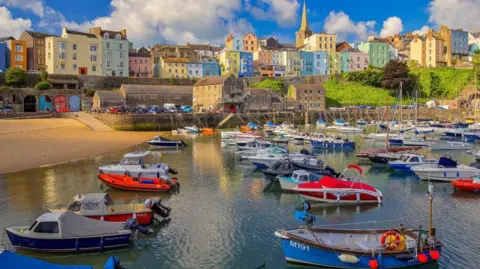Wales' tourism tax plans set for go-ahead
 Getty Images
Getty ImagesA new law allowing councils to tax people staying overnight in Wales is set to be passed by the Senedd later.
People staying in hotels could have £1.30 per night added to the cost of their stay if the plans go ahead.
Officials hope the tax will raise as much as £33m a year to support and improve tourist destinations, but businesses worry it might put visitors off.
The Welsh Conservatives vowed to scrap the tax if the party wins the 2026 Senedd election.
Plaid Cymru support for the legislation means the Welsh government has the numbers it needs to get the law through the Senedd.
Under the plans, those staying in hostels and campsites would pay 75p per person per night, while people staying in all other accommodation would pay the higher rate.
The charges are subject to VAT, while children under 18 will be exempt at hostels and campsites.
Plans for a tourism levy were promised in Labour's 2021 Senedd election manifesto, and in the party's now-defunct co-operation deal with Plaid Cymru.
They were drawn up following growing concerns about the impact of tourism in some Welsh communities.
It would be up to individual councils to decide whether to levy the charges, which would be introduced in 2027 at the earliest.
Local authorities could also decide after a year to increase the charges, in agreement with the Welsh government.
Some councils have said they have no plans to introduce the levy, including the Vale of Glamorgan, Rhondda Cynon Taf and Newport.
Cardiff council's leader Huw Thomas has said he wants to introduce the policy in the capital, and Anglesey has backed the idea in principle according to WalesOnline.
Under the legislation, councils have to spend the cash on managing and improving tourist destinations.
This could be things such as toilets, promoting the Welsh language, footpaths, beaches and visitor centres, but what the cash ends up funding will ultimately be up to councils to decide.
The Welsh government has estimated that the levy could generate £33m a year if all councils took it up.
An impact assessment drawn up for the law said the number of visitors could fall as a result of the plans.
It suggests that, in the most optimistic case, the levy could lead to 100 new jobs overall, but in the worst could see 390 fewer jobs.
Estimates for how much it will benefit or hit the economy range from a boost of £10.8m, to a reduction of £7.3m, when public spending is taken into account.
Without adding on how much might be spent by the public sector as a result of the levy, estimates range from a £9.1m hit to the economy, to a £26.8m hit.
'Long ceased to be a tourism tax'
Among those concerned with the plans have been the Welsh Tourism Alliance, who say that the way the bill has been drafted means councils do not need to focus on tourism when they decide how to spend the cash.
The Mid Wales Tourism group's Suzy Davies said the levy had "long ceased to be a tourism tax" because it would apply to "staying in visitor accommodation for any reason".
The Welsh Conservatives vowed to scrap the plans before they come into force, should they form a government after the next Senedd election.
Shadow finance cabinet secretary Sam Rowlands said the plans "will harm the economy to the tune of tens of millions of pounds and hundreds of jobs every single year".
Plaid Cymru's Luke Fletcher said the law would allow councils "to start the journey towards a sustainable tourism sector that works both for tourists and businesses alike".
Reform UK, which is hoping to win seats in the Senedd for the first time next May, said the tax would "hurt local businesses and cost rural jobs".
Accommodation providers will also be required to join a register under the law, which will be voted on by the Senedd on Tuesday afternoon.
Finance Secretary Mark Drakeford said: "We think it is fair visitors contribute towards local facilities, helping to fund infrastructure and services integral to their experience.
"Visitor levies are common around the world, benefiting local communities, tourists and businesses - and we want the same for Wales."
